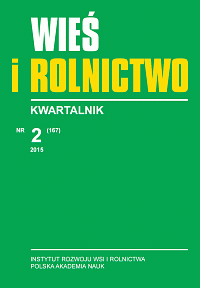Rolnicy a pozostali mieszkańcy wsi i miast. Analiza zmian sytuacji życiowej, postaw i orientacji politycznych po 1989 roku
Analysis of changes in circumstances, attitudes and political orientation of farmers and other residents of villages and towns after 1989
Author(s): Krystyna SzafraniecSubject(s): Social Sciences
Published by: Instytut Rozwoju Wsi i Rolnictwa Polskiej Akademii Nauk
Keywords: village; farmers; political transformation; change in attitudes and political orientation; Poland; wieś; rolnicy; transformacja ustrojowa; zmiany postaw i orientacji politycznych; Polska
Summary/Abstract: The author addresses a question of whether farmers in Poland are still, as was often emphasized economists and sociologists in the 90s, the “ballast of civilization and political change”. The analysis has been based on data from a study of “Poles” (1996, 2000, 2011), conducted from the pre-Solidarity era and uses this as a quasi-panel of large national samples. The period under analysis concerns a post-communist Poland, where two factors seem to be particularly important in the analysis of agriculture and rural areas: membership in the European Union and the increasing globalization of the world economy. After a period of “oppressive freedom”, associated with adopting the rules of a market economy, farmers and (to a slightly lesser degree) the rural areas in Poland have become the main beneficiaries of EU support. It is questioned whether these circumstances are changing attitudes of rural residents (including farmers) to changes in the political system, the state, and their own future? The answer is ambivalent. The tide of EU money may bring better living conditions in the countryside and reduces the differences between rural and urban dwelling, but does not contribute to the same degree to an increase in the competitiveness of farms. This has resulted in greater loyalty of farmers and other rural residents toward the system. This, however is disproportionate to the scale of financial support and very selective and does not eliminate claims of scale against the state, which in an era of globalization mainly influences social expectations.W artykule stawiam pytanie o to, czy rolnicy w Polsce są nadal – jak to często podkreślali ekonomiści i socjologowie w latach 90. – „balastem cywilizacyjnych i ustrojowych przemian”. Podstawą analiz są dane pochodzące z badań „Polacy”, realizowanych od czasów przed-Solidarnościowych pod kierunkiem Władysława Adamskiego jako quasi-panel na dużych ogólnopolskich próbach. Okres, który podlega analizie, dotyczy postkomunistycznej Polski, gdzie dwie okoliczności wydają się szczególnie ważne w analizach wsi i rolnictwa: członkostwo w Unii Europejskiej oraz postępująca globalizacja gospodarki światowej. Po latach „opresyjnej wolności”, związanej z wchodzeniem rolnictwa w reguły gospodarki rynkowej, rolnicy i obszary wiejskie w Polsce stali się głównymi beneficjentami unijnego wsparcia. Czy okoliczności te zmieniają nastawienia mieszkańców wsi (w tym rolników) wobec zmian ustrojowych, państwa, własnej przyszłości? Odpowiedź ma charakter ambiwalentny. Przypływ pieniędzy unijnych przynosi poprawę materialnych warunków życia na wsi i zmniejsza jej cywilizacyjny dystans do miasta, lecz nie przyczynia się w analogicznym stopniu do zwiększania konkurencyjności gospodarstw rolnych.
Journal: Wieś i Rolnictwo
- Issue Year: 167/2015
- Issue No: 2
- Page Range: 63-82
- Page Count: 20
- Language: Polish

